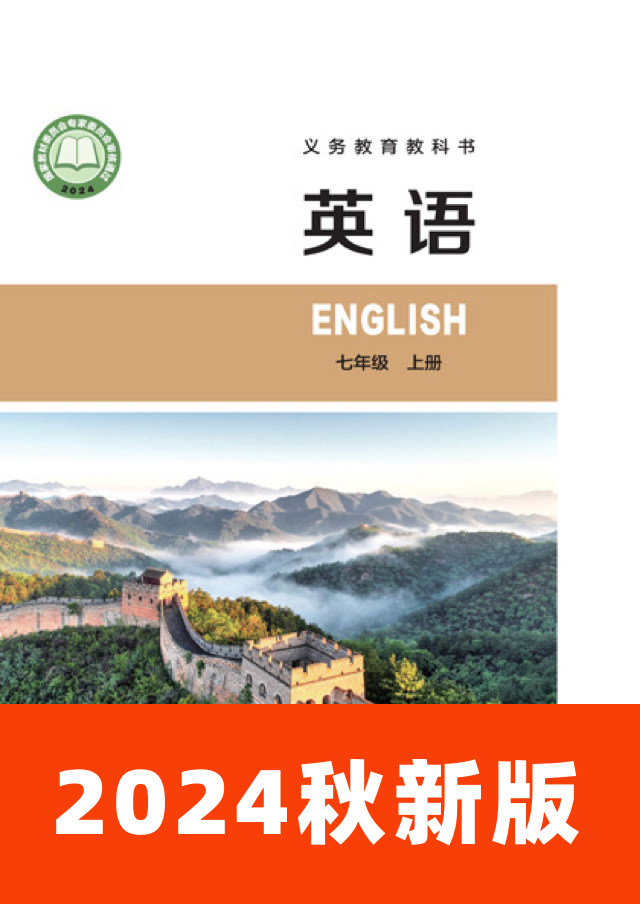Vocabulary in Each Unit课文原文、中英文对照及听力音频听读
Vocabulary in Each Unit 翻译:单元词汇表
Unit 1 翻译:第一单元
Topic Talk 翻译:话题讨论
grandparent 翻译:n. 祖父,祖母,外祖父,外祖母
husband 翻译:n. 丈夫
wife 翻译:n. 妻子(pl. wives)
daughter 翻译:n. 女儿
son 翻译:n. 儿子
same 翻译:adj. 同一的,相同的
policeman 翻译:n.(男)警察(pl. policemen)
only 翻译:adv. 只,只有,仅 adj. 仅有的,唯一的
together 翻译:adv. 在一起,共同
Lesson 1 翻译:第一课
member 翻译:n. 成员,分子
sweet 翻译:adj. 惹人喜爱的;甜的;令人愉快的 n. 糖果
active 翻译:adj. 积极的;活跃的
caring 翻译:adj. 乐于助人的,关心他人的
polite 翻译:adj. 有礼貌的,客气的
noisy 翻译:adj. 吵闹的,嘈杂的
violin 翻译:n. 小提琴
hers 翻译:pron. 她的
pilot 翻译:n. 飞行员
lots of 翻译:大量,许多
biscuit 翻译:n. 饼干
burn 翻译:vt. & vi.(使)烧焦,烤煳 vi. 燃烧
chess 翻译:n. 国际象棋
play chess 翻译:下国际象棋
really 翻译:adv. 确实,的确;事实上
mine 翻译:pron. 我的
yours 翻译:pron. 你的,您的,你们的
ours 翻译:pron. 我们的
theirs 翻译:pron. 他们的,她们的,它们的(所有物)
Lesson 2 翻译:第二课
character 翻译:n. (人的)品质,性格;人物,角色
trait 翻译:n.(人的个性的)特征,特性,特点
hobby 翻译:n. 业余爱好
activity 翻译:n. 活动
handsome 翻译:adj. 英俊的,漂亮的,有魅力的
pretty 翻译:adj. 漂亮的,标致的,动人的 adv. 颇,相当
pretty 翻译:adj. 漂亮的,标致的,动人的 adv. 颇,相当
smart 翻译:adj. 聪明的,精明的
patient 翻译:adj. 有耐心的,能忍耐的 n. 病人
model 翻译:n. 模型;范例;模范;模特儿
play basketball 翻译:打篮球
housework 翻译:n. 家务劳动,家务事
twin 翻译:n. & adj. 双胞胎之一(的)
different 翻译:adj. 不同的,有区别的
both 翻译:det. & pron. 两个,两个都
Lesson 3 翻译:第三课
weekend 翻译:n. 周末
water 翻译:vt. 给……浇水 n. 水
cleaning 翻译:n. 打扫,扫除,清洁
do the cleaning 翻译:打扫
tidy 翻译:vt. & vi. 使整洁,整理 adj. 整洁的,整齐的
Sunday 翻译:n. 星期日,星期天
spend 翻译:vt. 花(时间),度过 vt. & vi. 用,花(钱)
fun 翻译:n. 开心,好玩的事 adj. 有趣的,使人快乐的
usually 翻译:adv. 通常地,经常地
yard 翻译:n. 园圃,花园;码(长度单位)
dumpling 翻译:n. 饺子
delicious 翻译:adj. 美味的,可口的
chat 翻译:vi. & n. 闲聊,闲谈,聊天
Writing Workshop 翻译:写作练习
introduce 翻译:v. 把……介绍(给)
number 翻译:n. 数字,数;数量
teach 翻译:vt. & vi. 教,讲授
engineer 翻译:n. 工程师
be good at 翻译:擅长,精通
funny 翻译:adj. 滑稽的,好笑的
forward 翻译:adv. 向将来,往后;向前
look forward to 翻译:盼望,期待
Speaking Workshop 翻译:口语练习
classmate 翻译:n. 同班同学
pleased 翻译:adj. 高兴,愉快
have a good time 翻译:过得愉快
over there 翻译:那边
Unit 2 翻译:第二单元
life 翻译:n. 生活;生命;一生,终身 (pl. lives)
Topic Talk 翻译:话题讨论
history 翻译:n. 历史课;历史
geography 翻译:n. 地理(学)
information 翻译:n. 信息,消息,资料
communication 翻译:n. 通信;交际
technology 翻译:n. 技术
ICT 翻译:信息与通信技术
chemistry 翻译:n. 化学
biology 翻译:n. 生物学
physics 翻译:n. 物理学
paint 翻译:vt. & vi. 用颜料画;在……上刷油漆 n. 油漆
gymnastics 翻译:n. 体操,体操训练
more 翻译:det. & pron. (数、量等)更多的,更大的 adv. 更
quite 翻译:adv. 颇,相当
after-school 翻译:adj. 课后的,课外的
Lesson 1 翻译:第一课
break 翻译:n. 间歇,休息 vt. & vi. (使)破,裂;弄坏
practice 翻译:n. 练习;实践
club 翻译:n. 俱乐部,社团
start 翻译:vt. & vi. 开始,着手 n. 开头,开端
a.m. 翻译:abbr. 上午,午前
end 翻译:vt. & vi. 结束,终止 n. 终止,终结;结局,结尾
p.m. 翻译:abbr. 下午,午后
exciting 翻译:adj. 令人激动的,使人兴奋的
country 翻译:n. 国,国家
noon 翻译:n. 正午,中午
until 翻译:conj. & prep. 到……时,直到……为止
finish 翻译:vt. & vi. (使)结束;完成,做好 n. 结尾,结局
Lesson 2 翻译:第二课
preparation 翻译:n. 准备,预备;准备工作
prepare 翻译:vt. & vi. 使做好准备,把……预备好
textbook 翻译:n. 教科书
notebook 翻译:n. 笔记本;练习本
tape 翻译:n. 胶带,胶条;磁带
bottle 翻译:n. 一瓶(的量);瓶子
snack 翻译:n. 点心,小吃
case 翻译:n. 箱,盒;具体情况,事例
pencil case 翻译:铅笔盒
everything 翻译:pron. 每件事,所有事物,一切
ready 翻译:adj. 准备好,准备完毕
check 翻译:vt. 检查,核查
Lesson 3 翻译:第三课
dining 翻译:n. 进餐,用餐,吃饭
hall 翻译:n. 礼堂,大厅
dining hall 翻译:餐厅
lab 翻译:n. 实验室(=laboratory)
field 翻译:n. 运动场;田,地;场地
playing field 翻译:运动场,操场
gym 翻译:n. 体育馆,健身房(=gymnasium)
head teacher 翻译:(中小学)校长
experiment 翻译:n. 实验,试验
skill 翻译:n. 技能,技术
special 翻译:adj. 特设的,有专门目的的;特殊的,特别的
Monday 翻译:n. 星期一
Tuesday 翻译:n. 星期二
Friday 翻译:n. 星期五
outside 翻译:adv. 在外面;在户外 prep. 在……外面 n. 外部,外表
during 翻译:prep. 在……期间
enjoy 翻译:vt. 享受……的乐趣;欣赏,喜爱
Writing Workshop 翻译:写作练习
blog 翻译:n. 博客
post 翻译:n. 帖子,博文;邮寄 vt. & vi.(在网站上)发布 vt. 寄,邮寄
how many 翻译:多少
every day 翻译:每天
tennis 翻译:n. 网球
Speaking Workshop 翻译:口语练习
excuse 翻译:v. 原谅,宽恕
Excuse me. 翻译:劳驾,请原谅。
carry 翻译:vt. 拿,提,搬
Reading Club 1 翻译:阅读俱乐部1
weekday 翻译:n. 周工作日
Unit 3 翻译:第三单元
Topic Talk 翻译:话题讨论
furniture 翻译:n. 家具
equipment 翻译:n. 设备,器材
living room 翻译:客厅,起居室
bathroom 翻译:n. 浴室;洗手间,卫生间
bedroom 翻译:n. 卧室
bookcase 翻译:n. 书架,书柜
machine 翻译:n. 机器,机械装置
washing machine 翻译:洗衣机
fridge 翻译:n. 冰箱 (=refrigerator)
cooker 翻译:n. 厨灶,炉具
sofa 翻译:n. 长沙发
flat 翻译:n. 公寓,单元房(NAmE apartment) adj. 水平的,平坦的
sound 翻译:linking v. 听起来好像,让人听着好像 n. 声音,响声
Lesson 1 翻译:第一课
thing 翻译:n. 物件,物品,事物
shower 翻译:n. 淋浴器,淋浴间;淋浴
comfortable 翻译:adj. 使人舒服的,舒适的;愉快放松的
cream 翻译:adj. 奶油色的,乳白色的 n.奶油,乳脂
all kinds of 翻译:各种各样的
inside 翻译:adv. & prep. 在(或向)里面;在(或向)……内 n. 里面,内部 adj. 内部的,里面的
Lesson 2 翻译:第二课
dictionary 翻译:n. 词典,字典,辞书
bookshelf 翻译:n. 书架(pl. bookshelves)
next to 翻译:紧邻,在……近旁
need 翻译:v. 需要,必需 n. 需要,必须 modal v. 需要
either 翻译:adv.(用于否定)也 det. & pron.(两者中的)任何一个
messy 翻译:adj. 肮脏的,凌乱的
guess 翻译:vt. & vi. 猜测,估计
easily 翻译:adv. 容易地,不费力地
Lesson 3 翻译:第三课
building 翻译:n. 建筑物,楼房
crop 翻译:n. 庄稼,作物
mall 翻译:n. 购物商场,购物广场
e-pal 翻译:n. 网友
central 翻译:adj. 在中心的,中央的
community 翻译:n. 社区;社会
around 翻译:adv. 周围,四周;大约 prep. 围绕,环绕
friendly 翻译:adj. 友好的;善意的
neighbourhood 翻译:n. 街区,城区
luckily 翻译:adv. 幸运地;幸好
Writing Workshop 翻译:写作练习
describe 翻译:v. 描述,形容
dream 翻译:n. 梦想,理想;梦 vt. & vi. 做梦;想象
forest 翻译:n. 森林
fresh 翻译:adj. 清新的;新鲜的
view 翻译:n. 景色,风景;看法,见解 v. 把……视为,以……看待
magic 翻译:adj. 有魔力的 n. 魔法,法术
cloud 翻译:n. 云,云朵
fantastic 翻译:adj. 极好的,了不起的
fantastic 翻译:adj. 极好的,了不起的
Speaking Workshop 翻译:口语练习
office 翻译:n. 办公室;问询处,服务处
post office 翻译:邮局
of course 翻译:当然
onto 翻译:prep. 向,朝
road 翻译:n. 路,道路,公路
opposite 翻译:prep. 与……相对,在……对面 adj. 对面的,相反的
station 翻译:n. 站,所,局;火车站,汽车站
police station 翻译:警察局,派出所
along 翻译:prep. 沿着,顺着
past 翻译:prep. 在另一边,到另一侧 adj. 过去的,昔日的 n. 过去,昔日
bookshop 翻译:n. 书店
Reading Club 1 翻译:阅读俱乐部1
block 翻译:n. 大楼,一栋楼房;街区 v. 堵塞
row 翻译:n. 一排,一列,一行
Reading Club 2 翻译:阅读俱乐部2
shape 翻译:n. 形状,外形
Unit 4 翻译:第四单元
Topic Talk 翻译:话题讨论
practise 翻译:vt. & vi. 练习,实习,训练
guitar 翻译:n. 吉他
最新学习记录 更新时间:2026-02-02 03:28:35



 切换教材
切换教材